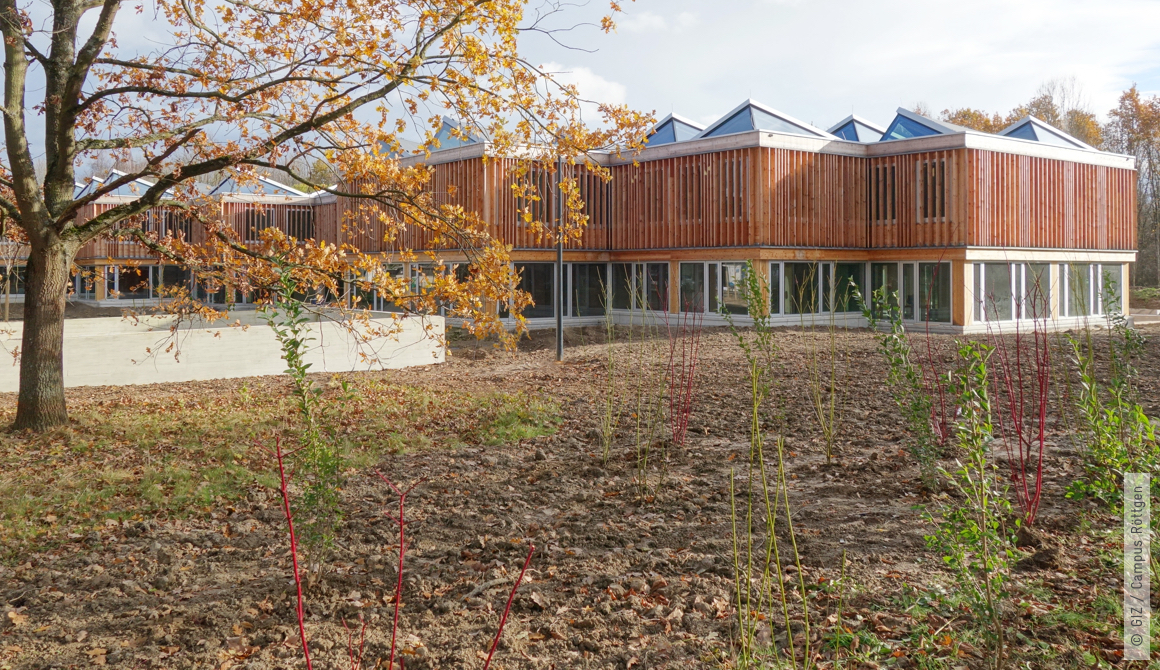Building sustainably and supporting biodiversity

IN OUR NEW BUILDINGS IN GERMANY, WE MEET THE HIGHEST SUSTAINABILITY STANDARDS AND COMPLY WITH THE CRITERIA OF THE GERMAN SUSTAINABLE BUILDING COUNCIL (DGNB). THE SAME APPLIES TO REDEVELOPMENTS. IN RENTED PROPERTIES TOO, WE WEIGH UP THE ENVIRONMENTAL, SOCIAL AND ECONOMIC ASPECTS. PROMOTING BIODIVERSITY IS A PRIORITY AT ALL OUR LOCATIONS.
Sustainable construction is an important aspect of our environmental management. The Property Division and the individual EMAS location officers work closely with the environmental management officer to achieve the goals we have set.
SETTING AN EXAMPLE FOR OTHER COMPANIES AND ORGANISATIONS
We are committed to sustainable construction in both redevelopment projects and new builds. In recent years, all new buildings have been planned, completed and certified in accordance with the Gold Standard of the German Sustainable Building Council (DGNB).
In February 2017, the foundation stone was laid for a new office building on GIZ’s campus in Bonn, which represents an estimated investment of EUR 158 million. The new building, with around 28,000 square metres, will provide space for approximately 850 workstations and has been planned in line with DGNB’s requirements. It is scheduled to be completed by the end of 2019 and certified to EMAS by 2020. Situated right next to the Meander Building, it will create a shared campus with space for around 1,500 employees.
GIZ’s new Kottenforst Campus location in Bonn-Röttgen, which is home to the Academy for International Cooperation (AIZ), was completed at the end of 2017. In addition to the existing buildings, another new building was constructed there at a cost of approximately EUR 30 million. This will be used to run seminars from 2018. The new building has its own geothermal system, a combined heat and power unit and an absorption chiller. It also has four fast charging stations for e-vehicles that are powered via the building’s own combined heat and power unit. The entire location will be certified to EMAS in 2018, with certification to DGNB set to follow in 2019.
With the exacting certification to DGNB, GIZ is aiming to set a good example for other companies and organisations and encourage them to follow suit. DGNB’s standards take account of not only technical and economic criteria, but also sociocultural minimum standards such as accessibility. They also evaluate land consumption, which has a direct environmental impact on biodiversity.
PROMOTING BIODIVERSITY CONSERVATION
GIZ has been a member of the cross-sector Biodiversity in Good Company initiative since it was first established in 2011. The initiative is a collaboration of companies from a variety of sectors that have joined forces to promote the protection and sustainable use of the world’s biodiversity. It therefore helps implement the international Convention on Biological Diversity.
We are also:
- a member of the Biodiversity Network Bonn (BION);
- a full member of the International Union for Conservation of Nature (IUCN);
- a full member of the German Association of Environmental Management (B.A.U.M.).
BIODIVERSITY STRATEGY IN AND OUTSIDE GERMANY
GIZ’s properties in Germany are mainly located in inner-city areas. The limited space offers little potential to promote biodiversity. Nonetheless, our properties are an advertisement for our company. We therefore strive to make our grounds and gardens insect-friendly and to plant native species and create green roofs. We also keep sealed surfaces to a minimum. The four buildings on the Kottenforst Campus are situated on the edge of Kottenforst forest, which is part of the Rhineland Nature Park and is largely protected by nature conservation laws (as it provides a habitat for fauna and flora). We therefore place special emphasis on biodiversity here.
In our Environmental Programme, we have set ourselves the goal of developing a strategy for the biodiversity-friendly planning of all our EMAS locations. We also inform our service providers about GIZ’s biodiversity conservation, thus underlining the importance of this topic.
In procurement, we make sure that products are environmentally sustainable by applying relevant criteria. When purchasing wood products, in particular, we pay special attention to biodiversity conservation in our procurement and tender processes and apply corresponding international standards. In our canteens, we also make a conscious effort to incorporate into our ingredients fruit and vegetable varieties that are grown regionally.
INITIATIVES IN GERMANY: GIZ STAFF ARE ACTIVELY INVOLVED
In Germany, a number of voluntary environmental initiatives have also been launched by enthusiastic employees. The bee group in Eschborn, for example, not only takes care of its bees, but also sells the honey they produce within the company in aid of good causes. In 2017, members of the bee colony were brought to Bonn, where a separate bee group was established. The Meander gardeners in Bonn have also turned their hands to urban gardening. In their lunch breaks and after work, they devote their time to growing and harvesting old varieties of vegetables, for example.
OUTSIDE GERMANY, SUSTAINABILITY ISSUES ARE TAKEN INTO ACCOUNT WHEREVER POSSIBLE
Sustainable construction is not an explicit area of action in the CSH. Most buildings in our partner countries are rented, and many colleagues work from the premises of our partner organisations. Compared with building projects in Germany, which are designed to meet GIZ’s needs, this limits the scope of what we can do to address this environmental issue. However, countries directors and project managers do take sustainability issues into account wherever possible when constructing and renting property in countries outside Germany.
FURTHER INFORMATION
The new building on the Kottenforst campus was built to the latest ecological standards. Read the press release on the opening and take a 360-degree tour: Campus Kottenforst opens
More about our Academy for International Cooperation on the Kottenforst Campus: GIZ as an employer: Increasing employability
The new office building on GIZ’s campus in Bonn: Foundation stone laid at GIZ campus in Bonn
Urban gardening in Bonn: Staff commitment to sustainability
Our networks and cooperation arrangements: Our stakeholder management